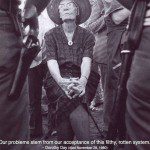The New York Daily News nailed it today.
GNight all. Just hoping there’s not another mass shooting before I wake up in the morning. pic.twitter.com/G1AOkOn8I6
— JustJanis (@jsavite) December 3, 2015
As did the Dalai Lama two weeks ago after the Paris attacks:
We cannot solve this problem only through prayers. I am a Buddhist and I believe in praying. But humans have created this problem, and now we are asking God to solve it. It is illogical. God would say, solve it yourself because you created it in the first place. We need a systematic approach to foster humanistic values, of oneness and harmony. If we start doing it now, there is hope that this century will be different from the previous one. It is in everybody’s interest. So let us work for peace within our families and society, and not expect help from God, Buddha or the governments.
I’m sympathetic toward average every-day individuals who say things like, “I’ll keep you in my prayers” for friends or family in times of distress, or even in response to tragedies such as Wednesday’s events in California (and Georgia, where the day’s other mass shooting occurred). In fact I sometimes say this myself, depending on who I’m speaking with. The words themselves, at times, are helpful and compassionate. And, when they are really the most a person can give, when a distant friend announces that her mother is in the hospital, for instance, then fine, offer your prayers and do your best to actually think good thoughts or send well-wishes to the people in need.
But when you can do more, when you are in a position of power (perhaps you are the president of the hospital that is denying treatment to your distant friend’s sick mother), then you’d better well act on those prayers or well-wishes. Today, politicians in America are in positions to greatly curb gun violence simply by implementing what I and many of my more centrist and right-leaning friends would consider very reasonable gun control measures.
And yet, will they? (google around to see how much each is taking from the NRA…)
While Republicans in Congress resist the most basic steps to curb gun access by violent offenders, the public is much more reasonable. Even among gun owners, 85 percent approve of universal background checks, according to a poll this year.
Likewise, an overwhelming share of gun owners support cracking down on firearms dealers who are careless or lose track of guns. Majorities of gun owners also favor banning people under 21 from having a handgun and requiring that guns be locked up at home. [via Nicholas Kristof, see below]
America is virtually drowning in guns, more than one for every man, woman, and child living in the country. And speaking of children, have you noticed how many people are being killed by toddlers (with guns) in America lately? And, even more stark, Nicholas Kristof writes today:
It’s too soon to know exactly what happened in San Bernardino, but just in the last four years, more people have died in the United States from guns (including suicides and accidents) than Americans have died in the wars in Korea, Vietnam, Afghanistan and Iraq combined. When one person dies in America every 16 minutes from a gun, we urgently need to talk about remedies.
Democrats, including President Obama, emphasize the need to address America’s problems with guns. Republicans talk about the need to address mental health. Both are right.
The sad fact of the matter:
Mass shootings now the norm, not the exception. https://t.co/wVDvln4AZL pic.twitter.com/VDqmwbb2Wp
— S Brent Plate (@splate1) December 3, 2015
And, as recent news suggests that at least one of today’s killers was a Muslim, it’s worth reiterating the need for basic religious literacy for all citizens in our country. In a wonderful article published yesterday in the Chronicle of Higher Education, Ulrich Rosenhagen advocates (on campuses, but applicable outside of higher ed) for the need for interreligious dialogue along with opportunities for individuals to challenge their own beliefs in order to realize that no religion is a monolith.
In a globalized world increasingly threatened by religious extremism and fanaticism, educators must think about how religious education can play an important role in helping their students become global citizens. They must give students knowledge of the religious backgrounds of the disputes that dominate our world, and to train students to be ready to recognize when religious ideas and motivations are being hijacked by extremists abroad and at home.
Basic literacy means not jumping to blame Islam for this (or Christianity for the recent Planned Parenthood killings). Basic literacy means knowing enough about the long histories of major religions to realize that many interpretations of scripture are possible, that many understandings of theory and practice exist. It means being willing and able to talk with people of different religious backgrounds openly and in good faith and, as the Dalai Lama suggested, being willing to take part in “a systematic approach to foster humanistic values, of oneness and harmony.”
And again, that approach will require action, not just thoughts and prayers, from those in positions of power to curb violence in America.












